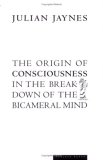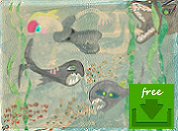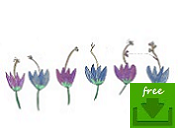 Claire's Original Art Greeting Cards
There is nothing that says I care like a real snail-mail greeting card!
Click on a picture above for a plain-paper printable greeting card pdf.
Print on regular 8.5 by 11 printer paper. Fold twice so that the art is on the front and the title and copyright are on the back.
Write your greeting on the inside.
Mail in an A2 Invitation Envelope.
Claire's Original Art Greeting Cards
There is nothing that says I care like a real snail-mail greeting card!
Click on a picture above for a plain-paper printable greeting card pdf.
Print on regular 8.5 by 11 printer paper. Fold twice so that the art is on the front and the title and copyright are on the back.
Write your greeting on the inside.
Mail in an A2 Invitation Envelope.Read Julian Jaynes for Help in Getting Your Brain To Do What You Want It To
June 9th, 2008 · No Comments

The most interesting book I’ve yet read gave me insight into getting my brain to do what I want it to do.
It is Julian Jaynes‘s The Origin of Consciousness in the Breakdown of the Bicameral Mind, copyright 1976.
Many writers since seem to be building on Jaynes’s basic concepts. For example Professor “you heard it here first” Douglas Hofstadter of Indiana University explains that we think in analogies as if Jaynes’s chapter on metaphor doesn’t say the same thing. (You can listen to Professor Hofstadter’s lecture “Analogy as the Core of Cognition” on iTunes courtesy of Stanford University.)
He describes a “collective cognitive imperative” changing over human history. What you believe to be true controls your life. When people believed that the world was flat and a sailing ship would fall off the edge in the abyss, sailors did not stray farther than they dared. Most of us believe what the people around us believe, but, just like the sailors of yore, we don’t know what’s holding us back.*
Jaynes uses ancient literature, including the Bible, to surmise how people used to think. He explains that consciousness as we know it, a verbal narration of self in the world’s time-space, evolved into being around 1500 BC when there were great natural phenomenon causing massive human migrations and the gods failed.
Jaynes uses artifacts to support his assertion that before the onset of consciousness, people listened directly to their gods. The gods were with them just like intuition is with us in our brains today without requiring that we “think.” (Social hierarchies solved the problems of conflicting information from gods. Particular gods—and the people who heard them—had more authority than others.)
This intuitive god came from the right hemisphere of the brain, which is less used today for thinking but is activated for music and song. Thus the reciting of ancient epics such as the Iliad in rhythmic and melodic poetry.
People did not have the concept of time or a concept of space. There was no deception or deceit—how could there be when man controlled nothing? They attributed memory to gods. Just as before the 18th century AD there was no concept of authoritative suggestion affecting the outcome of experiments on people.
Jaynes considers all decisions to be stress. The gods made decisions. There was no concept of chance, because the gods ruled all aspects of life.
The gods failed as different groups, each with their own gods, mingled, and the idea occurred that other humans could have something completely foreign but every bit as legitimate going on in their heads. (This is hard for many to grasp even today even with all our politically correct discussion about diversity!)
People turned to such things as oracles (the Oracle of Delphi being one of many), poets, and auguries. Reading tea leaves, the I Ching, and tossing coins and astrology helped them through the stresses of deciding what to do. “[T]here was no concept of chance and so the casting of lots had to be controlled by gods.” (page 381-2)
Everyone had idols—religious symbols—still today a “socially cohesive force” (page 337). The priest’s robe, the governor’s seal, the doctor’s white coat became a method of authorizing actions and enforcing hierarchy.
Religion and science became ways of coping when listening directly to the gods was replaced by consciousness. No longer were the gods readily available. Instead people prayed/postulated/experimented that the absolute truth would come. (Jaynes uses the phrase “nostalgia for the divine.”)
The ancient gods also admonished behavior, an activity taken over by ANTS (Automatic Negative Thoughts) often about WPT (What other People Think).
“[W]hy is it that in our daily lives we cannot get up above ourselves to authorize ourselves into being what we really wish to be . . . so that whatever in us it is that we refer to as will stands master and captain over action . . .? (page 402)
We look for authorization for our thoughts and activities in a personal narrative and in social constructs that both are limited by our learned, individual and collective, consciousness.
When we realize that the way we think, our consciousness, is culture dependent, when we realize it’s malleable, we can change profoundly.
*An easy but hardly profound example: if you believe hypnotism works but only if the subject is sitting, it will work for you when you’re sitting but not when you’re standing.
(There was the placebo concept.)
Tags: Social Psychology







0 responses so far ↓
There are no comments yet...Kick things off by filling out the form below.
Leave a Comment